- Home
- Julia Quinn
The Girl With the Make-Believe Husband
The Girl With the Make-Believe Husband Read online
Dedication
For Nana Vaz de Castro,
who created a movement.
It's probably a good thing
I can't get Bob’s Ovomaltine shakes
in the United States.
And also for Paul.
There's got to be some irony in the fact that
I wrote about a make-believe husband
while you were gone for three months
climbing Mount Everest.
But that mountain is real. And so are you.
And so are we.
Contents
Cover
Title Page
Dedication
Chapter 1
Chapter 2
Chapter 3
Chapter 4
Chapter 5
Chapter 6
Chapter 7
Chapter 8
Chapter 9
Chapter 10
Chapter 11
Chapter 12
Chapter 13
Chapter 14
Chapter 15
Chapter 16
Chapter 17
Chapter 18
Chapter 19
Chapter 20
Chapter 21
Chapter 22
Epilogue
About the Author
By Julia Quinn
Copyright
About the Publisher
Chapter 1
Manhattan Island
June 1779
His head hurt.
Correction, his head really hurt.
It was hard to tell, though, just what sort of pain it was. He might have been shot through the head with a musket ball. That seemed plausible, given his current location in New York (or was it Connecticut?) and his current occupation as a captain in His Majesty’s Army.
There was a war going on, in case one hadn’t noticed.
But this particular pounding—the one that felt more like someone was bashing his skull with a cannon (not a cannonball, mind you, but an actual cannon)—seemed to indicate that he had been attacked with a blunter instrument than a bullet.
An anvil, perhaps. Dropped from a second-story window.
But if one cared to look on the bright side, a pain such as this did seem to indicate that he wasn’t dead, which was also a plausible fate, given all the same facts that had led him to believe he might have been shot.
That war he’d mentioned . . . people did die.
With alarming regularity.
So he wasn’t dead. That was good. But he also wasn’t sure where he was, precisely. The obvious next step would be to open his eyes, but his eyelids were translucent enough for him to realize that it was the middle of the day, and while he did like to look on the metaphorical bright side, he was fairly certain that the literal one would prove blinding.
So he kept his eyes closed.
But he listened.
He wasn’t alone. He couldn’t make out any actual conversation, but a low buzz of words and activity filtered through the air. People were moving about, setting objects on tables, maybe pulling a chair across the floor.
Someone was moaning in pain.
Most of the voices were male, but there was at least one lady nearby. She was close enough that he could hear her breathing. She made little noises as she went about her business, which he soon realized included tucking blankets around him and touching his forehead with the back of her hand.
He liked these little noises, the tiny little mmms and sighs she probably had no idea she was making. And she smelled nice, a bit like lemons, a bit like soap.
And a bit like hard work.
He knew that smell. He’d worn it himself, albeit usually only briefly until it turned into a full-fledged stink.
On her, though, it was more than pleasant. Perhaps a little earthy. And he wondered who she was, to be tending to him so diligently.
“How is he today?”
Edward held himself still. This male voice was new, and he wasn’t sure he wanted anyone to know he was awake yet.
Although he wasn’t sure why he felt this hesitancy.
“The same,” came the woman’s reply.
“I am concerned. If he doesn’t wake up soon . . .”
“I know,” the woman said. There was a touch of irritation in her voice, which Edward found curious.
“Have you been able to get him to take broth?”
“Just a few spoonfuls. I was afraid he would choke if I attempted any more than that.”
The man made a vague noise of approval. “Remind me how long he has been like this?”
“A week, sir. Four days before I arrived, and three since.”
A week. Edward thought about this. A week meant it must be . . . March? April?
No, maybe it was only February. And this was probably New York, not Connecticut.
But that still didn’t explain why his head hurt so bloody much. Clearly he’d been in some sort of an accident. Or had he been attacked?
“There has been no change at all?” the man asked, even though the lady had just said as much.
But she must have had far more patience than Edward, because she replied in a quiet, clear voice, “No, sir. None.”
The man made a noise that wasn’t quite a grunt. Edward found it impossible to interpret.
“Er . . .” The woman cleared her throat. “Have you any news of my brother?”
Her brother? Who was her brother?
“I am afraid not, Mrs. Rokesby.”
Mrs. Rokesby?
“It has been nearly three months,” she said quietly.
Mrs. Rokesby? Edward really wanted them to get back to that point. There was only one Rokesby in North America as far as he knew, and that was he. So if she was Mrs. Rokesby . . .
“I think,” the male voice said, “that your energies would be better spent tending to your husband.”
Husband?
“I assure you,” she said, and there was that touch of irritation again, “that I have been caring for him most faithfully.”
Husband? They were calling him her husband? Was he married? He couldn’t be married. How could he be married and not remember it?
Who was this woman?
Edward’s heart began to pound. What the devil was happening to him?
“Did he just make a noise?” the man asked.
“I . . . I don’t think so.”
She moved then, quickly. Hands touched him, his cheek, then his chest, and even through her obvious concern, there was something soothing in her motions, something undeniably right.
“Edward?” she asked, taking his hand. She stroked it several times, her fingers brushing lightly over his skin. “Can you hear me?”
He ought to respond. She was worried. What kind of gentleman did not act to relieve a lady’s distress?
“I fear he may be lost to us,” the man said, with far less gentleness than Edward thought appropriate.
“He still breathes,” the woman said in a steely voice.
The man said nothing, but his expression must have been one of pity, because she said it again, more loudly this time.
“He still breathes.”
“Mrs. Rokesby . . .”
Edward felt her hand tighten around his. Then she placed her other on top, her fingers resting lightly on his knuckles. It was the smallest sort of embrace, but Edward felt it down to his soul.
“He still breathes, Colonel,” she said with quiet resolve. “And while he does, I will be here. I may not be able to help Thomas, but—”
Thomas. Thomas Harcourt. That was the connection. This must be his sister. Cecilia. He knew her well.
Or not. He’d never actually met the lady, but h
e felt like he knew her. She wrote to her brother with a diligence that was unmatched in the regiment. Thomas received twice as much mail as Edward, and Edward had four siblings to Thomas’s one.
Cecilia Harcourt. What on earth was she doing in North America? She was supposed to be in Derbyshire, in that little town Thomas had been so eager to leave. The one with the hot springs. Matlock. No, Matlock Bath.
Edward had never been, but he thought it sounded charming. Not the way Thomas described it, of course; he liked the bustle of city life and couldn’t wait to take a commission and depart his village. But Cecilia was different. In her letters, the small Derbyshire town came alive, and Edward almost felt that he would recognize her neighbors if he ever went to visit.
She was witty. Lord, she was witty. Thomas used to laugh so much at her missives that Edward finally made him read them out loud.
Then one day, when Thomas was penning his response, Edward interrupted so many times that Thomas finally shoved out his chair and held forth his quill.
“You write to her,” he’d said.
So he did.
Not on his own, of course. Edward could never have written to her directly. It would have been the worst sort of impropriety, and he would not have insulted her in such a manner. But he took to scribbling a few lines at the end of Thomas’s letters, and whenever she replied, she had a few lines for him.
Thomas carried a miniature of her, and even though he said it was several years old, Edward had found himself staring at it, studying the small portrait of the young woman, wondering if her hair really was that remarkable golden color, or if she really did smile that way, lips closed and mysterious.
Somehow he thought not. She did not strike him as a woman with secrets. Her smile would be sunny and free. Edward had even thought he’d like to meet her once this godforsaken war was over. He’d never said anything to Thomas, though.
That would have been strange.
Now Cecilia was here. In the colonies. Which made absolutely no sense, but then again, what did? Edward’s head was injured, and Thomas seemed to be missing, and . . .
Edward thought hard.
. . . and he seemed to have married Cecilia Harcourt.
He opened his eyes and tried to focus on the green-eyed woman peering down at him.
“Cecilia?”
Cecilia had had three days to imagine what Edward Rokesby might say when he finally woke up. She’d come up with several possibilities, the most likely of which was: “Who the hell are you?”
It would not have been a silly question.
Because no matter what Colonel Stubbs thought—no matter what everyone at this rather poorly outfitted military hospital thought, her name was not Cecilia Rokesby, it was Cecilia Harcourt, and she most definitely was not married to the rather handsome dark-haired man lying in the bed at her side.
As for how the misunderstanding had come about . . .
It might have been something to do with her declaring that she was his wife in front of his commanding officer, two soldiers, and a clerk.
It had seemed a good idea at the time.
She’d not come to New York lightly. She was well aware of the dangers of traveling to the war-torn colonies, to say nothing of the voyage across the temperamental North Atlantic. But her father had died, and then she’d received word that Thomas was injured, and then her wretched cousin had come sniffing around Marswell . . .
She couldn’t remain in Derbyshire.
And yet she’d had nowhere to go.
So in what was probably the only rash decision of her life, she’d packed up her house, buried the silver in the back garden, and booked passage from Liverpool to New York. When she arrived, however, Thomas was nowhere to be found.
She’d located his regiment, but no one had answers for her, and when she persisted with her questions, she was dismissed by the military brass like a pesky little fly. She’d been ignored, patronized, and probably lied to. She’d used up nearly all her funds, was getting by on one meal a day, and was living in a boardinghouse room directly next to a woman who might or might not have been a prostitute.
(That she was having relations was a certainty; the only question was whether she was being paid for them. And Cecilia had to say, she rather hoped she was, because whatever that woman was doing, it sounded like an awful lot of work.)
But then, after nearly a week of getting nowhere, Cecilia overheard one soldier telling another that a man had been brought to hospital a few days earlier. He’d had a blow to the head and was unconscious. His name was Rokesby.
Edward Rokesby. It had to be.
Cecilia had never actually laid eyes on the man, but he was her brother’s closest friend, and she felt like she knew him. She knew, for example, that he was from Kent, that he was the second son of the Earl of Manston, and that he had a younger brother in the navy and another at Eton. His sister was married, but she had no children, and the thing he missed most of all from home was his cook’s gooseberry fool.
His older brother was called George, and she had been surprised when Edward had admitted that he did not envy him his position as heir. With an earldom came an appalling lack of freedom, he’d once written, and he knew that his place was in the army, fighting for King and Country.
Cecilia supposed that an outsider might have been shocked at the level of intimacy in their correspondence, but she’d learned that war made philosophers of men. And maybe it was for that reason that Edward Rokesby had begun adding little notes of his own at the end of Thomas’s letters to her. There was something comforting about sharing one’s thoughts with a stranger. It was easy to be brave with someone one would never face across a dining table or in a drawing room.
Or at least this was Cecilia’s hypothesis. Maybe he was writing all the same things to his family and friends back in Kent. She’d heard from her brother that he was “practically engaged” to his neighbor. Surely Edward was penning letters to her, too.
And it wasn’t as if Edward was actually writing to Cecilia. It had started with little snippets from Thomas: Edward says such-and-such or I am compelled by Captain Rokesby to point out . . .
The first few had been terribly amusing, and Cecilia, stuck at Marswell with mounting bills and a disinterested father, had welcomed the unexpected smile his words brought to her face. So she replied in kind, adding little bits and pieces to her own missives: Please tell Captain Rokesby . . . and later: I cannot help but think that Captain Rokesby would enjoy . . .
Then one day she saw that her brother’s latest missive included a paragraph written by another hand. It was a short greeting, containing little more than a description of wildflowers, but it was from Edward. He’d signed it
Devotedly,
Capt. Edward Rokesby
Devotedly.
Devotedly.
A silly smile had erupted across her face, and then she’d felt the veriest fool. She was mooning over a man she’d never even met.
A man she probably never would meet.
But she couldn’t help it. It didn’t matter if the summer sun was shining brightly across the lakes—with her brother gone, life in Derbyshire always seemed so gray. Her days rolled from one to the next, with almost no variation. She took care of the house, checked the budget, and tended to her father, not that he ever noticed. There was the occasional local assembly, but over half the men her age had bought commissions or enlisted, and the dance floor always contained twice the number of ladies as gentlemen.
So when the son of an earl wrote to her of wildflowers . . .
Her heart did a little flip.
Honestly, it was the closest she’d got to a flirtation in years.
But when she had made the decision to travel to New York, it had been her brother, and not Edward Rokesby, that she had been thinking about. When that messenger had arrived with news from Thomas’s commanding officer . . .
It had been the worst day of her life.
The letter had been addressed to her father, of
course. Cecilia had thanked the messenger and made sure he was given something to eat, never once mentioning that Walter Harcourt had died unexpectedly three days earlier. She’d taken the folded envelope to her room, closed and locked the door, and then stared at it for a long, shaky minute before summoning the courage to slide her finger under the wax seal.
Her first emotion had been one of relief. She’d been so sure it was going to tell her that Thomas was dead, that there was no one left in the world she truly loved. An injury seemed almost a blessing at that point.
But then Cousin Horace had arrived.
Cecilia hadn’t been surprised that he had shown up for her father’s funeral. It was what one did, after all, even if one didn’t enjoy particularly close friendships with one’s relations. But then Horace had stayed. And by God, he was annoying. He did not speak so much as pontificate, and Cecilia couldn’t take two steps without him sidling up behind her, expressing his deep worry for her well-being.
Worse, he kept making comments about Thomas, and how dangerous it was for a soldier in the colonies. Wouldn’t they all be so relieved when he returned to his rightful place as owner of Marswell.
The unspoken message being, of course, that if he didn’t return, Horace would inherit it all.
Bloody, stupid entail. Cecilia knew she was supposed to honor her forebearers, but by God, if she could go back in time and find her great-great-grandfather, she would wring his neck. He’d bought the land and built the house, and in his delusions of dynastic grandeur he’d imposed a strict entail. Marswell went from father to son, and if not that, any male cousin would do. Never mind that Cecilia had lived there her entire life, that she knew every nook and cranny, that the servants trusted and respected her. If Thomas died, Cousin Horace would swoop in from Lancashire and take it all away.
Cecilia had tried to keep him in the dark about Thomas’s injury, but news like that was impossible to keep under wraps. Some well-meaning neighbor must have said something, because Horace didn’t wait even a full day after the funeral before declaring that as Cecilia’s closest male relative, he must assume responsibility for her welfare.
Clearly, he said, they must marry.
No, Cecilia had thought in shocked silence. No, they really must not.

 Just Like Heaven
Just Like Heaven B03.2 An Offer from a Gentleman Ep II
B03.2 An Offer from a Gentleman Ep II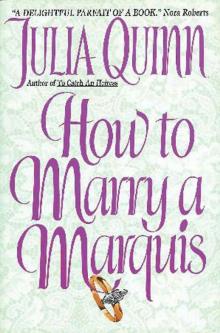 How to Marry a Marquis
How to Marry a Marquis When He Was Wicked: The 2nd Epilogue
When He Was Wicked: The 2nd Epilogue Ten Things I Love About You
Ten Things I Love About You The Viscount Who Loved Me
The Viscount Who Loved Me The Duke and I
The Duke and I B05.2 To Sir Philip With Love Ep II
B05.2 To Sir Philip With Love Ep II An Offer From a Gentleman: The 2nd Epilogue
An Offer From a Gentleman: The 2nd Epilogue Minx
Minx On the Way to the Wedding with 2nd Epilogue
On the Way to the Wedding with 2nd Epilogue Mr. Cavendish, I Presume
Mr. Cavendish, I Presume A Night Like This
A Night Like This Splendid
Splendid Everything and the Moon
Everything and the Moon When He Was Wicked
When He Was Wicked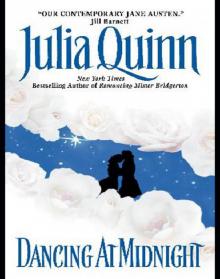 Dancing at Midnight
Dancing at Midnight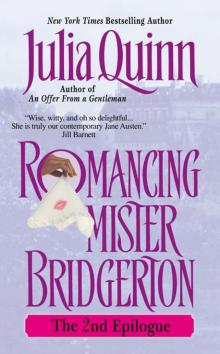 Bridgerton 04: 2nd Epilogue - Romancing Mister Bridgerton
Bridgerton 04: 2nd Epilogue - Romancing Mister Bridgerton The Lost Duke of Wyndham
The Lost Duke of Wyndham To Sir Phillip, With Love
To Sir Phillip, With Love It's in His Kiss
It's in His Kiss The Other Miss Bridgerton
The Other Miss Bridgerton Bridgerton 02: 2nd Epilogue - The Viscount Who Loved Me
Bridgerton 02: 2nd Epilogue - The Viscount Who Loved Me The Secrets of Sir Richard Kenworthy
The Secrets of Sir Richard Kenworthy On the Way to the Wedding
On the Way to the Wedding The Secret Diaries of Miss Miranda Cheever
The Secret Diaries of Miss Miranda Cheever Because of Miss Bridgerton
Because of Miss Bridgerton What Happens in London
What Happens in London JQuinn - The Secret Diaries of Miss Miranda Cheever
JQuinn - The Secret Diaries of Miss Miranda Cheever The Girl With the Make-Believe Husband
The Girl With the Make-Believe Husband First Comes Scandal
First Comes Scandal To Catch an Heiress
To Catch an Heiress The Sum of All Kisses
The Sum of All Kisses An Offer From a Gentleman
An Offer From a Gentleman The Bridgertons: Happily Ever After
The Bridgertons: Happily Ever After Bridgerton Collection Volume 1 (Bridgertons)
Bridgerton Collection Volume 1 (Bridgertons)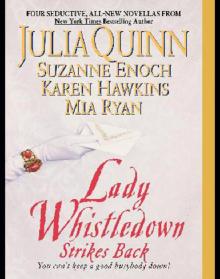 Lady Whistledown Strikes Back
Lady Whistledown Strikes Back Secret Diaries of Miss Miranda Cheever
Secret Diaries of Miss Miranda Cheever An Offer from a Gentleman with 2nd Epilogue
An Offer from a Gentleman with 2nd Epilogue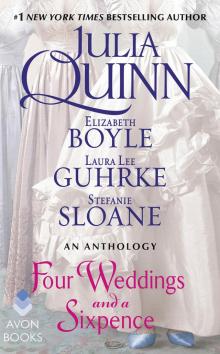 Four Weddings and a Sixpence
Four Weddings and a Sixpence An Offer from a Gentleman: The Epilogue II
An Offer from a Gentleman: The Epilogue II The Further Observations of Lady Whistledown
The Further Observations of Lady Whistledown The Viscount Who Loved Me: The Epilogue II
The Viscount Who Loved Me: The Epilogue II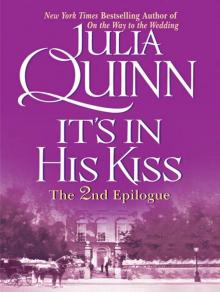 It’s In His Kiss Epilogue II
It’s In His Kiss Epilogue II To Sir Phillip, with Love: The Epilogue II
To Sir Phillip, with Love: The Epilogue II The Secret Diaries of Miss Miranda Cheevers
The Secret Diaries of Miss Miranda Cheevers A Night Like This (Smythe-Smith Quartet)
A Night Like This (Smythe-Smith Quartet) The Lady Most Likely...
The Lady Most Likely... Bridgerton 06: 2nd Epilogue - When He Was Wicked
Bridgerton 06: 2nd Epilogue - When He Was Wicked Just Like Heaven sq-1
Just Like Heaven sq-1 Gretna Greene
Gretna Greene